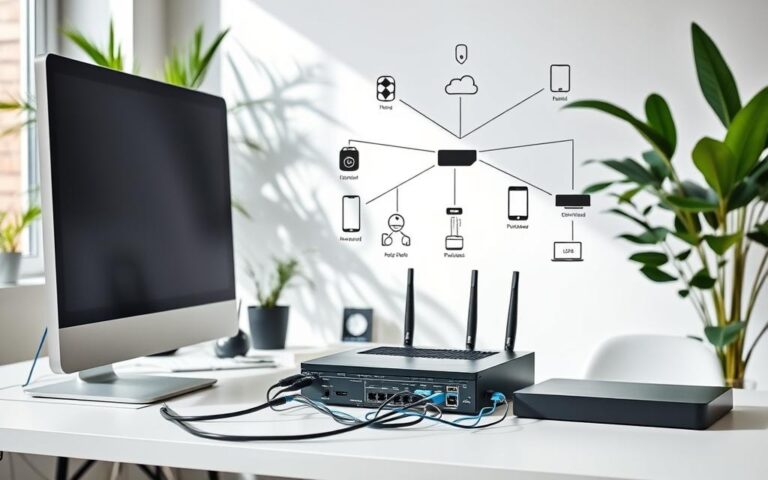Top Benefits of Using a Computer Network for Efficiency and Collaboration
In today’s fast-paced business world, a computer network is key for better efficiency and teamwork. It connects devices and lets data be shared. This changes how businesses work, making communication and teamwork easier. It boosts productivity and efficiency, making computer networks a must-have for today’s businesses.
Industry stats show computer networks are used in business, education, and healthcare to boost teamwork. By setting up a network, businesses can share resources, cut costs, and work better together. This leads to more efficiency and productivity. Computer networks help businesses run smoother and more effectively.
Computer networks are vital for team work, sharing data, and progress in many fields. They offer many benefits like better communication, cost savings, and data safety. Businesses can stand out in their markets by using computer networks. They help businesses perform better, leading to more success and growth.
Understanding Computer Networks in Modern Business
In today’s fast-paced modern business world, a good computer network is key. It helps with communication, sharing data, and working together. Networked systems have changed how businesses work, making things faster and smoother.
A computer network lets businesses share things like printers and servers. It makes sharing data between departments quick and easy. With more people working from home, a strong networked system is vital for success.
The Evolution of Networked Systems
The first computer network was set up in the late 1960s by the Department of Defense. It grew into ARPANET. Now, networked systems help with big communication tasks in business, entertainment, and research.
Key Components of Business Networks
A good computer network has parts like routers, switches, gateways, and ports. These work together to make sure data gets where it needs to go in a networked system.
https://www.youtube.com/watch?v=iyLWgpghjHY
How Networks Transform Operations
In modern business, a solid computer network is essential. It stops productivity loss, keeps data safe, and helps grow the business. By focusing on networked systems, companies can save money, reduce downtime, and make things more efficient.
| Network Type | Description |
|---|---|
| LAN | Connects computers within a short distance, such as in an office building |
| WAN | Connects computers across large geographical areas |
| PAN | Serves one person and allows syncing of content between multiple devices |
What Are the Benefits of Using a Computer Network in Today’s Workplace
Using a computer network at work brings many advantages. It makes teamwork better, communication clearer, and work more efficient. By linking devices and shared resources, like printers, businesses can work smarter and faster. The benefits of computer networks in today’s workplace are huge and touch many parts of business.
Key benefits include file sharing, resource sharing, and increased storage capacity. These help businesses work better and make it easier for staff to share and access info. Also, computer networks help teams talk and work together in real-time.
Computer networks can also save money. They help cut down on paper use and storage needs. Plus, they make it easier to keep data safe with firewalls and antivirus software.

- Improved communication and collaboration
- Increased efficiency and productivity
- Enhanced security and data protection
- Cost savings and reduced waste
- Improved access to information and resources
In summary, the advantages of using computer networks in today’s workplace are obvious. They help businesses run better, work more efficiently, and be more productive. As technology keeps getting better, the benefits of computer networks will likely grow even more.
Enhanced Resource Sharing and Accessibility
Computer networks have changed how businesses work. They make resource sharing and accessibility better. By linking devices, companies can share data and use resources more efficiently. This saves money and boosts productivity.
One big plus of computer networks is sharing things like printers and scanners. This cuts costs and makes workspaces more efficient. Also, sharing software lets many users access the same apps. This means fewer licenses to buy and easier updates.
Centralised Data Management
Centralised data management is key in computer networks. It helps manage data and ensures everyone has the same info. It also makes updating software easier and safer.
Benefits of Resource Sharing
The perks of resource sharing and accessibility in computer networks are many:
- Less money spent on sharing hardware and software
- Work gets done faster and better
- Users work better together
- Keeping software up to date is easier
Using computer networks helps businesses run smoother. They save money and work more efficiently. Being able to share resources and access info from anywhere is a big plus for today’s businesses.
| Resource Sharing | Benefits |
|---|---|
| Hardware Resource Sharing | Reduced costs, optimized workspace utilization |
| Software Resource Sharing | Minimized need for individual software licenses, simplified software maintenance |
| Centralised Data Management | Improved data management, simplified software management |
Streamlined Communication Channels
Effective communication channels are key for any business’s success. Streamlined communication boosts collaboration among team members. Computer networks help teams connect and talk in real-time, making work better and fewer mistakes.
The perks of streamlined communication channels are many:
- Improved customer service
- Increased productivity
- Reduced costs
- Enhanced cooperation
- Improved data security
Good network infrastructure saves money in the long run. It cuts down on costs, less downtime, and avoids big problems. A strong network can bounce back fast from issues, thanks to backup systems and disaster plans.
With streamlined communication channels, businesses get more done, spend less, and work better together. This happens by making a plan for communication, getting the right tech, and using different communication channels.

| Benefits of Streamlined Communication | Description |
|---|---|
| Improved Customer Service | Enhanced customer experience, increased sales, and customer loyalty |
| Increased Productivity | Reduced time and money wastage, enhanced cooperation, and faster task completion |
| Reduced Costs | Minimized travel, printing, and postage costs, improved decision-making |
Cost-Effective Business Operations
Setting up a computer network can make business operations cheaper. It cuts down on hardware costs and maintenance. This means businesses can use their resources better. They can also switch to newer, energy-saving tech.
Being cost-effective means making processes smoother and cutting down on waste. Businesses can save money and be greener by using their resources wisely. This is helped by virtual local area networks (VLANs). They help manage network issues and boost performance.

- Reduced hardware expenses through the use of energy-efficient equipment
- Minimized maintenance costs through regular network upgrades and maintenance
- Improved energy efficiency through the use of modern, energy-efficient technologies
Cost-effective business practices help companies work better and be more competitive. They also help the environment. A well-planned computer network is key. It makes processes smoother, cuts waste, and saves energy.
Improved Data Security and Backup Solutions
Keeping data safe is key for any business. Computer networks help with better data security and backup solutions. Strong network security and backup plans protect data and keep things running if disaster strikes. Dell says businesses lose over $1.7 trillion yearly due to data loss and downtime, showing how vital reliable backup solutions are.
A good network security plan includes regular backups. You can use full, incremental, or differential backups. How often you back up depends on how often data changes. For important data, backing up daily is best.
Keeping backups somewhere else, like in the cloud, helps protect against damage. This means you’re safe from fires or floods. It’s also smart to check your backups often to make sure they work. Tools that watch your backups can send alerts right away. For more on setting up a network and keeping data safe, check this resource.
Some main benefits of strong backup solutions and network security are:
- Less chance of losing data and being offline
- Better business continuity
- Better data security and protection against cyber threats
- Following data privacy and retention laws
By focusing on data security and using good backup solutions, businesses can lower data loss risks. This ensures they keep running smoothly, helping them grow and succeed.
Boosting Team Collaboration and Productivity
Effective team collaboration is key for businesses to reach their goals and stay ahead. Technology, like online collaboration tools, helps teams work better together. This leads to higher productivity and better results. For example, using platforms like Google Drive and Google Hangouts makes communication and project management easier.
Project management is a big part of team collaboration. Tools that help with real-time communication and task assignment make teamwork smoother. A study found that online collaboration tools can greatly improve team work and productivity. You can find out more about how customer relationship management technology boosts team collaboration and productivity.
- Improved communication and reduced errors
- Increased productivity and efficiency
- Enhanced creativity and innovation
Creating a culture of collaboration and using the right tools can unlock a team’s full power. This leads to greater success for businesses.
Scaling and Future-proofing Your Network Infrastructure
As businesses grow, their network needs to scale and adapt. This means using new network technologies to keep up with demands. The aim is to keep operations smooth and handle more data and users.
Network scalability means a system can grow with your business. It handles more users, devices, or data without slowing down. This is key for keeping your network running well and your business running smoothly.
Network Expansion Strategies
For a scalable network, you need a solid plan. This includes using technologies like software-defined networking (SDN). It makes managing your network easier and more flexible. Other important technologies include AIOps, AI networking, and cloud-native architectures.
Emerging Network Technologies
New technologies like AI and IoT are vital for a future-proof network. They help teams work better together, improve security, and boost sales. Studies show businesses see a 40% jump in team collaboration and a 75% boost in security after upgrading their IT.
By focusing on scalability and future-proofing, businesses can meet market demands. Regularly check and improve your network use. Use scalable tech like SDN. A well-planned network ensures smooth operations and long-term success.
Conclusion: Embracing Networked Solutions for Business Success
Computer networks bring many benefits that can change how businesses work and help them succeed. By using networked solutions, companies can improve communication, teamwork, and productivity. They also save money and keep data safe.
In today’s fast-changing digital world, business success depends on a company’s network. A good network lets businesses work from anywhere and manage data better. This helps them quickly meet new market needs.
By using networked solutions, businesses make a smart choice for their future. They prepare their systems for the future and use the latest network tech. This way, they can grow and stay profitable in a world that’s more digital than ever.
FAQ
What are the key benefits of using a computer network for businesses?
Using a computer network helps businesses share resources and access them easily. It also makes communication smoother and more efficient. This leads to cost savings and better data security. Plus, it boosts team collaboration and productivity.
How do computer networks transform modern business operations?
Computer networks have changed how businesses work. They make communication, data sharing, and resource access faster. This revolutionises operations by connecting devices and optimising resources, improving efficiency and teamwork.
What are the essential components of a business computer network?
A business computer network includes LANs and WANs. It also has devices and software for data sharing and communication. These components help manage resources and enhance operations.
How can computer networks enhance resource sharing and accessibility within a business?
Computer networks help manage data centrally and optimise hardware. They also manage software licenses. This allows businesses to use resources better, cut costs, and work more efficiently.
What are the communication and collaboration benefits of using a computer network?
Computer networks make communication faster and collaboration easier. They support real-time project management and remote work. This boosts team productivity and reduces mistakes.
How can computer networks help businesses reduce costs and drive efficiency?
Computer networks reduce hardware, maintenance, and energy costs. This makes businesses more cost-effective and sustainable.
What are the data security and backup benefits of a computer network?
Computer networks offer better data security and backup. They protect critical data and ensure business continuity during disasters.
How can computer networks help businesses future-proof their network infrastructure?
Businesses can future-proof their networks by expanding and adopting new technologies. This ensures their networks grow and adapt to changing demands.














